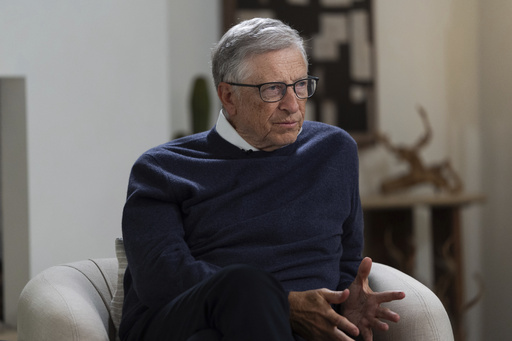Microsoft co-founder Bill Gates is set to celebrate his 70th birthday later this year with the release of his new memoir, “Source Code: My Beginnings.” This book serves as the first part of a trilogy that aims to trace Gates’ journey from a misunderstood child to a prominent figure in technology and an influential philanthropist. In the memoir, Gates reflects on how his unique upbringing, friendships, and experiences have contributed to his complex internal landscape.
“Source Code” delves into incidents from his youth, such as the emotional scars left by the tragic death of his high school best friend and the inception of Traf-O-Data. Gates launched this venture in Albuquerque, New Mexico, alongside childhood friend Paul Allen to develop software for the Altair computer. This endeavor paved the way for the foundation of Microsoft in 1975, which earned a mere $16,005 during its early year, while both he and Allen received $9 per hour for their work.
By 1977, Microsoft had grown sufficiently for Gates to leave Harvard University and in 1979, he relocated the company back to his hometown of Seattle. Even though Gates stepped down as CEO 25 years ago, the software products created under his leadership continue to play a critical role in the success of Microsoft, which now boasts an annual revenue of $212 billion and a market valuation of $3.1 trillion. This corporate behemoth also forms the backbone of Gates’ personal wealth, estimated at around $100 billion.
The memoir concludes with Gates’ return to Seattle in 1979, notably excluding significant life events like his 1994 marriage to Melinda French and their eventual divorce in 2021. In discussing his book, Gates remarked, “I am being reflective, which is not my normal mode, but it’s kind of time.” He expressed fascination as he revisited teacher feedback and memories from his Harvard years, revealing a misconception he held about his academic performance in ninth grade.
Gates offers a candid view of his younger self, describing himself as a “bratty smartass” who often dismissed comments he found nonsensical. He was known as “Trey” by his grandmother since he was the third Bill in the family line. As a child, Gates struggled with shyness and social interactions until he discovered his passion for computers, which he compared to slot machines rewarding him for writing clever code.
In the book, Gates reflects on his restiveness and the challenges he faced with focus and attention in school. He recounts instances where teachers were unsure if they should advance him or hold him back, leaving him confused. It was only later in life that he recognized his neurodivergence and how it played a significant role in channeling his focus towards programming—an endeavor that ultimately shaped his career.
Despite his affluent upbringing that allowed him to attend a private high school, Gates faced profound emotional trauma with the loss of his best friend, Kent Evans, in a climbing accident in 1972. The shock of losing someone who not only understood him but encouraged him left a deep impact, and he describes it as the sole dark moment of his childhood, stating, “It shapes you, that someone can just disappear.” The absence of Evans prompted Gates to reconnect with Allen, who played an extensive role in his programming pursuits.
During their renewed partnership, they experimented with more than just coding, including attempts at psychedelic experiences. Gates recounts his initial reluctance to try LSD, finally giving in before his graduation in 1973. However, after a multitude of discomforting experiences, he decided that he was better off avoiding psychedelic drugs, contrasting sharply with the lifestyle choices of contemporaries like Steve Jobs, who believed such experiences could enhance creativity.
Currently, Gates finds himself captivated by rapid advancements in artificial intelligence, especially in light of Microsoft’s collaboration with OpenAI. He remarked on the awe-inspiring capabilities of AI and has urged caution, calling it an “amazing and scary” technology that requires vigilant monitoring. Gates believes that both policymakers and technologists must collaborate to ensure the safe development of AI.
Ultimately, Gates hopes that “Source Code” provides a more humane glimpse into his life, diverging from the cold corporate image often associated with him. He candidly admits, “I wouldn’t say I was completely uncool,” while also acknowledging the singular focus that propelled Microsoft’s success during his early years. Looking forward, there is anticipation for deeper insights into his intense drive in future volumes, with the next installment not expected until at least 2027.
